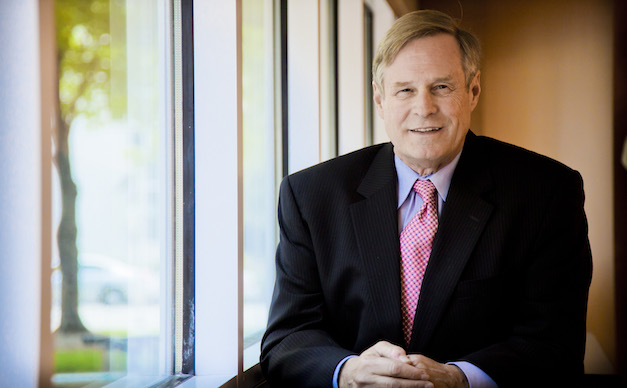Shanor retires after four decades of teaching, advocacy, practice

Shanor founded both the Volunteer Clinic for Veterans and the International Humanitarian Law Clinic
Charles Shanor will retire this month after 41 years of teaching. In addition to his role as a beloved professor, he also established institutions that will endure at Emory Law well beyond his tenure.
In 2013, Shanor created the Emory Law Volunteer Clinic for Veterans with Director Emeritus Lane Dennard and two student leaders; he currently serves as co-director. The clinic and its students have received national recognition for service to Georgia veterans. To date, its pro bono efforts have resulted in the recovery of more than $5 million in benefits wrongly denied to veteran clients. Shanor also founded the International Humanitarian Law Clinic, which is now led by Director Laurie Blank.
During his career, Shanor established himself as a leading voice in several fields, including employment and employment discrimination law, constitutional law, and national security and counterterrorism law. He enjoys the distinction of one of his early articles being cited in both the majority and dissenting opinions of a United States Supreme Court decision, and his casebooks remain in wide circulation, used by thousands of students nationwide.
"I've had a wonderful and varied career in teaching, government service, and private practice,” Shanor said. “Mentoring students through classes, textbooks and clinics has always been my main love. Emory has enthusiastically supported my changes of professional emphasis, and my engaged colleagues and the annual influx of eager students have made the work fun. What more can one ask of a career?"
From 1987 to 1990, Shanor served as general counsel of the U.S. Equal Employment Opportunity Commission in Washington, D.C. (The university granted leave for distinguished service.) Serving as general counsel, Shanor argued a case before the U.S. Supreme Court with the permission of the solicitor general.
“It was the only time any general counsel at the agency has done that,” Shanor said. “It was a highlight of my government service.”
“During his years at the EEOC, Charlie continued to teach seminars at Emory on Friday evenings or Monday mornings as he commuted back to Atlanta,” said Emory Law Dean Robert Schapiro. After returning to Emory, Shanor held a part-time of counsel position with Paul, Hastings, Janofsky and Walker, where he specialized in appellate litigation and class action defense in the employment discrimination field.
Beyond his teaching and scholarship, Shanor served as associate dean in the early 1980s. During his tenure he led a revamping of the first-year curriculum that is largely still in place. He was also instrumental in starting the Emory Bankruptcy Developments Journal, and worked with the family of Randolph Thrower 36L to establish the annual Thrower Symposium. Shanor led the effort to construct the Elbert Parr Tuttle Courtroom, named for the U.S. Court of Appeals Fifth Circuit judge renowned for his opinions on civil rights cases. Shanor has been active in governance at the law school and served the university in many capacities, in addition to a long record of civic activities in Atlanta.
During 2016 commencement ceremonies, Shanor received the Ben F. Johnson Faculty Excellence Award, an honor that recognizes excellence in teaching and a sustained commitment to legal education. He has also received the Black Law Students Association Outstanding Teacher Award and the Emory Williams Award for Outstanding Teaching.
“It has been my honor to be Charlie’s colleague and friend. He is an extraordinary teacher, advisor and leader,” Schapiro said. “His example of service, collegiality and ethical engagement represents the highest ideals of our profession.”
Shanor will continue his work with the Volunteer Clinic for Veterans at least through the end of August, as he transitions leadership to Director Drew Early. He and his wife, Susan, will retire in Asheville, N.C., where Shanor will continue work on veterans’ behalf.
“I will be working with other law schools to set up veterans clinics using the model Lane and I established at Emory,” he says.